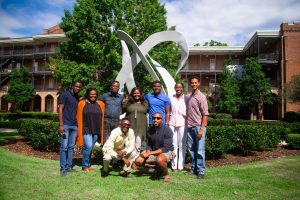
From the Winter 2019 Collegian | Awa Traore had a few qualifications for institutions where she would pursue her PhD in mathematics: one that was close to her home in Birmingham, and one where she would be encouraged and pushed to be successful throughout her program. When she learned that two other black women were successfully working their way through UA’s program, she decided that she could see herself at UA.
“When I came here, and I saw there were already two other black women pursuing their PhDs in mathematics, and seeing them succeed made me want to pursue my PhD at UA, as well,” Traore said. “I already knew that I wanted to get my PhD, but seeing their success made me feel like I could do it here. I saw people who looked like me who finished and got their degrees and did really well, so I thought it was a good place to get mine.”
Creating an environment where all students could feel welcome and appreciated has always been important to UA mathematics professor Dr. David Cruz-Uribe. When he became chair of the department, one of his major goals was diversifying the program. He and the graduate programs director, Dr. David Halpern, and the faculty decided to create a community where underrepresented minorities and women could feel like their work was valued.
“Recruiting and retaining minority students is all about building community,” Cruz-Uribe said. “We started going to conferences—big ones, little ones, conferences aimed at minority students and faculty, and general mathematics conferences—and telling students and faculty about the advantages that our program has for all types of students. And then when the number of minority applications started to go up, we took the applicants very seriously.”
This year, the department’s entering class of 17 graduate students includes four women and eight black students, a statistic well above the national average. Cruz-Uribe’s goal is to maintain this diverse atmosphere, eventually creating a graduate program that is made up of 50 percent women and 20 to 25 percent underrepresented minorities. But for him, the work doesn’t stop at recruitment—he wants to retain his students, as well.
“The evidence nationwide shows that women and minority graduate students fail out of graduate programs at higher rates than white men do,” Cruz-Uribe said. “So what can I do to make them successful? I’m going to expect everyone to work for it, for sure, but I want to make sure that there’s nothing else in their way. That’s what we’re going to spend the next four or five years doing.”
Because of its success in recruiting and retaining minority graduate students, the department was awarded this year’s Departmental Diversity Award from the College of Arts and Sciences. The award goes to departments determined to make the campus and its faculty, staff, and students more diverse and inclusive. The mathematics department plans to put the $5,000 prize towards that mission. Over the next few years, Cruz-Uribe and Halpern plan to visit more conferences and meet more students, as well as use the money to help faculty effectively mentor their graduate students.